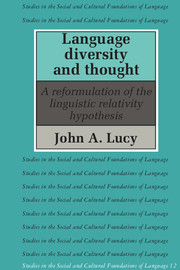Book contents
- Frontmatter
- Contents
- List of figures
- Acknowledgments
- Introduction
- 1 Development of the linguistic relativity hypothesis in America: Boas and Sapir
- 2 Development of the linguistic relativity hypothesis in America: Whorf
- 3 Approaches in anthropological linguistics: typical ethnographic case studies
- 4 Approaches in anthropological linguistics: theoretical and methodological advances
- 5 Approaches in comparative psycholinguistics: experimental studies on the lexical coding of color
- 6 Approaches in comparative psycholinguistics: experimental studies on grammatical categories
- 7 Overview and assessment of previous empirical research
- Notes
- References
- Index
4 - Approaches in anthropological linguistics: theoretical and methodological advances
Published online by Cambridge University Press: 05 June 2012
- Frontmatter
- Contents
- List of figures
- Acknowledgments
- Introduction
- 1 Development of the linguistic relativity hypothesis in America: Boas and Sapir
- 2 Development of the linguistic relativity hypothesis in America: Whorf
- 3 Approaches in anthropological linguistics: typical ethnographic case studies
- 4 Approaches in anthropological linguistics: theoretical and methodological advances
- 5 Approaches in comparative psycholinguistics: experimental studies on the lexical coding of color
- 6 Approaches in comparative psycholinguistics: experimental studies on grammatical categories
- 7 Overview and assessment of previous empirical research
- Notes
- References
- Index
Summary
Introduction
The previous chapter characterized direct empirical research on the linguistic relativity issue within anthropological linguistics. This chapter reviews later achievements within this tradition which have attempted to provide solutions or new perspectives on crucial theoretical and methodological problems in previous research. Although this work explicitly addresses Whorf's formulations, it has yet to give rise to direct empirical evaluations of the linguistic relativity issue itself. But the work does provide the foundation for such research by providing an improved understanding of the structure and functioning of the linguistic analysis of experience.
Advances have been made in three areas. First, more refined approaches to comparing the diversity of classifications across languages have emerged. This work both provides the foundation for a new empirical comparison and clarifies the way in which linguistic classifications are distinctively “linguistic” in nature. Second, the earlier interest in the diversity of linguistic classifications (structure) has been supplemented by an increasing emphasis on the diverse uses (functions) of language not only across language groups but even within a single language community. This work opens up an entirely new dimension of the relativity problem. Third, more specific content has been given to the notion that speakers have differential awareness of their various language categories. This work illuminates the process by which language categories influence thought and, in conjunction with the work on the diverse uses of language, suggests another new dimension of the relativity problem.
- Type
- Chapter
- Information
- Language Diversity and ThoughtA Reformulation of the Linguistic Relativity Hypothesis, pp. 84 - 126Publisher: Cambridge University PressPrint publication year: 1992



